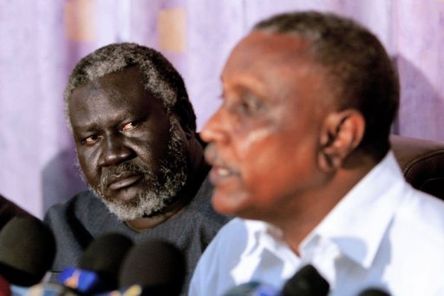
JUBA, South Sudan — A political showdown in Sudan is imminent as both the ruling National Congress Party, or NCP, and the newly formed Sudan Revolutionary Front, or SRF, attempt to enlist more support from undecided opposition parties in Sudan. Soon enough all Sudanese political parties may face a dilemma: either accept the ruling NCP government or become part of the opposition coalition—a political contest that may have the potential to divide the country into two major political forces. In the absence of any other prominent opposition alliance, the SRF will have to demonstrate that it has the power to replicate the Sudan People’s Liberation Movement, or SPLM, of the late John Garang, which stood as the major opposition force to the Khartoum government prior to South Sudan’s secession.
In response to the statement by the U.N. Secretary-General Ban Ki-Moon in which he condemned establishment of the SRF, Yasir Arman told the Enough Project, “The Sudan Revolutionary Front is growing.” In addition to both the military wing and grassroots side of the Democratic Unionist Party, or DUP, the Beja Congress of eastern Sudan and the Kush from northern Sudan are supporting the front. Arman said, “The SRF is working on building wide political consensus in Sudan.”
Arman told Enough that the SRF is reaching out to other political parties, including the Umma Party of Sadiq al-Mahdi and the Popular Congress Party, or PCP, of Hassan al-Turabi.
Over the past six months the DUP has been contemplating a decision to join the government. The DUP political leadership has been negotiating with the NCP in the past months while the party’s armed wing allegedly fought along side Agar’s SPLA-N in Blue Nile’s ongoing conflict.
When asked his reaction to the DUP’s moves to possibly join the NCP, Major General Fadlalla Burma Nasir, the deputy secretary general of another opposition group, the National Umma Party, or NUP, told Enough that if the DUP joined the government it “would create big divisions within the leadership and the (DUP) party supporters.”
Indeed, internal divisions were evident in a recent statement issued by the al-Fateh, the military wing of the DUP. The military leader, Abbas Taj Alsir Obaid expressed disappointment in the leadership of the DUP that “flocked to the National Congress Party in order to participate in the government.” He condemned the participation, “which will shake and split the party,” and warned that al-Fatah will “work very hard to stop all the attempt[s] to participate in the government with the NCP.” He added, “The struggle continues until victory.”
The NUP’s Fadlalla told Enough that his own party is cooperating with all other opposition movements, including the SRF. He excluded possibility that the NUP would join the SRF as “they differ in the means they use.” However, he added that his group and the SRF “ do share the same objectives.” Moreover, he said the NUP leadership has adopted an approach of “popular and peaceful revolution” while concurrently “cooperating with the brothers who adopted military means.”
Fadlalla said the current regime is leading the country “to become something like Somalia” and said that this time around Sudanese people have great opportunity to “join hand in hand together” and prevent further disintegration of Sudan.
When asked about their political platform, Saddiq Youssef of the Sudanese Communist Party, or SCP, told Enough that his party’s goal is to overthrow the government by democratic means. He said that even though the SCP has common objectives with the SRF, they too exclude the possibility of joining the Kauda Alliance based on the fact that the SRF “has taken up the arms” in their anti-government campaign, while the communist party is advocating for “peaceful transformation.” Youssef blames the current Khartoum regime for policies that have led to separation of the South and to outbreak of wars across the country.
Opposition groups in Sudan are united in their view that the Bashir government bears sole responsibility for current political crisis and worsening economic situation. All advocate the policy that the regime change is necessary in order to bring peace in the country. Fadlalla of the NUP was infuriated by the recent military actions by the Sudan Armed Forces, or SAF, in South Sudan. He said that Sudan and South Sudan should be as “twin brothers,” as both countries have strong interest in mutual cooperation. But he said that it is “the current regime that is preventing that from happening.”
Khartoum’s rigidness in dealing with internal conflict creates a situation wherein the regime diverts attention from the tension within the country by provoking conflict beyond or near its borders. Attacks on South Sudan by the Sudan Armed Forces, or SAF, and alleged proxy military operations over the past months have served this purpose effectively. As long as there are unresolved issues with South Sudan, the international community will focus on those conflicts that fit within the narrative long established through years of civil war—but to the detriment of the plight of marginalized groups within Sudan. Khartoum utilizes the international community’s focus on North-South issues as an opportunity to undercut the rebellion in the separated Sudan by forcing those populations who do not fit within the ruling party’s vision of Sudan to flee to South Sudan, and preferably, remain there.
By this simple equation, as long as the Khartoum regime keeps the international community on a short leash by threatening to go to war against South Sudan, the Sudanese government avoids international outcry regarding their internal transgressions.
Photo: SPLA/M-North leaders Yasir Arman and Malik Agar (Reuters)

